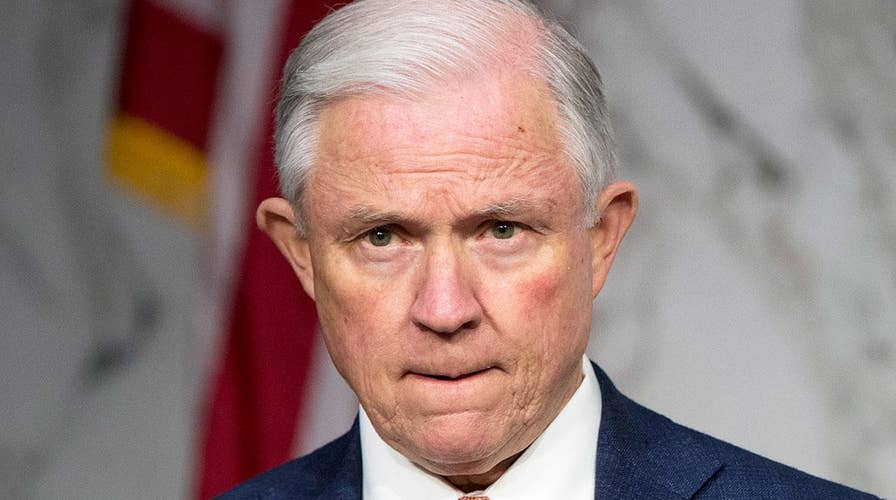Jeff Sessions issues tougher criminal charging policy
Attorney general calls for reversal of Holder-era policy known for leniency on drug crimes
Getting tough on serious crime was a central focus of the Trump campaign, and so far Jeff Sessions, the new Attorney General, has not disappointed. His latest action, a memorandum to all federal prosecutors amending the Obama policy of going easy on serious offenders, orders federal prosecutors to charge criminals with the most serious offense that is readily provable – that is, charge with the crime that carries the most severe sentence -- including a mandatory minimum sentence.
In practical terms, the memo to prosecutors reverses the Obama policy of looking the other way at serious crimes and, where a criminal was arrested for multiple crimes, charging him with one of the lesser ones in order to lock him up for a shorter sentence, or not lock him up at all. The memo also restores the law to the way Congress wrote it in the first place.
By directing federal prosecutors to “charge and pursue the most serious, readily provable offense” in felony cases, as Attorney General Jeff Sessions did last week, he is fulfilling the government’s primary responsibility: protect American citizens from harm, and provide them with a safe environment.
Sessions’ new policy is aimed at serious habitual offenders – not first offenders, casual marijuana users or shoplifters.
Sessions’ new policy is aimed at serious habitual offenders – not first offenders, casual marijuana users or shoplifters. Only the most serious crimes are brought before the federal courts, illegal drug cases being the most common – there were over 22,000 drug prosecutions in federal court during 2015, one-third of all federal prosecutions. Just under 90 percent of those cases, according to the US Sentencing Commission, involved drug trafficking, usually involving interstate transport of drugs, and more often than not using firearms. Knowing what we do about drug traffickers, those who were caught were career criminals – people who trafficked in drugs dozens, hundreds, even thousands of times for each arrest.
By the time a drug dealer gets convicted for the third time in federal court, you can bet that he has done many more drug deals than three: there is about a 90 percent certainty that he has actually committed thirty or more felonies, he just didn’t get caught. If, as the law calls for, he is sentenced for a minimum of fifteen years for that third conviction, the sentencing judge has likely just prevented dozens, if not hundreds more people from being his victims.
Restrictions on the use of mandatory minimum sentences remove one of the most effective tools prosecutors have to lock up major dealers. Drug traffickers rarely work alone, it takes an elaborate hierarchy to transport and distribute large quantities of narcotics and manage the resulting large amounts of cash, collect their debts and protect their territory. When an arrest is made of a pusher lower on the totem pole, prosecutors will use the threat of a severe sentence as a bargaining chip to work up the chain to nab the kingpin and those just under him. Charging one of the lowly ones with a 15 year mandatory minimum can be a very effective way of getting the fellow to rat on his colleagues in return for a deal on the sentence.
The policies Sessions is re-instituting were enacted by Congress in the mid-1980s when violent crime rates were going through the roof and crack-cocaine dealers ruled the streets of many American cities. Those laws were designed to lock up armed drug traffickers and violent criminals. The good news is, they worked. Over the next two decades, as the prison population swelled, crime went down, and by 2014 violent crime rates had been cut in half.
The reason? Because serious and violent criminals don’t just commit an offense now and then. It is their career, can be very lucrative, with the result that they commit crime after crime. For every arrest, criminologists estimate that an offender may commit dozens, if not hundreds of offenses. So locking the right guy up for a long time simply prevents hundreds of crimes from being committed.
The Obama-Holder-Lynch Justice Department, in response to pressure from the left, changed those policies, abandoning mandatory minimum sentences where they could, letting serious offenders out of prison early, and softening the entire approach to incarceration of criminals. And surprise: crime rates have started going up again. Over 50,000 people died in 2016 from drug overdoses; more deaths from heroin overdoses than from guns, the opioid epidemic is killing more people than crack cocaine did at the height of that epidemic. The murder rate in big cities like Chicago and Baltimore is up by double digits just in the past couple of years.
And the criminals responsible for all of this? The people that the new Justice Department policy says should be charged with the most serious offense possible.
As Jeff Sessions said in one of his first memos to officials working for him after becoming the Attorney General, the Justice Department’s mission is “to ensure public safety, to provide federal leadership in preventing and controlling crime, and to ensure fair and impartial administration of justice for all Americans.”
His new directive on sentencing is a fine first step.

